One Day Awareness Programme at Conference Hall, Office of the Commissioner of Police, Dimapur

Dimapur, November 1 (MExN): The Nagaland State Commission for Protection of Child Rights (NSCPCR), in collaboration with the Office of the Commissioner of Police, organised a one-day awareness programme on ‘Child Rights & Child Protection’ on October 31. The event was held at the conference hall of the Commissioner of Police’s office in Dimapur, stated a DIPR report.
In his keynote address, NSCPCR Chairman Alung Hangsingh highlighted the unique challenges faced in the districts of Niuland, Chümoukedima, and Dimapur, where different cultures converge.
He stated that with the advent of technology, the situation is becoming “complicated and challenging,” particularly for police officers handling child abuse cases and children in conflict with the law.
Hangsingh emphasised that while police officers must be well-versed with the IPC and CrPC, dealing with cases under the POCSO Act or JJ Act requires a different approach from the standard procedure for criminals.
He cited the rapid dissemination of information due to technological advancement as a key reason for officers to be “very conscious” in handling such cases properly.
Reminding that children are the “backbone of the nation,” the chairman questioned how far the state has progressed in achieving this goal. He underscored the critical role of policing, stating that the presence of police officers provides a vital “sense of security” for children.
Asserting that the Commission is striving to reach every corner of the state through such programmes, Hangsingh noted that the initiative began at the SP office in Kohima and the Dimapur event was the third such interaction with police officers.
He expressed hope that the session would enable the officers to gain valuable insights from the interaction.
DCP, HQ, Ruth Murru, NPS emphasised that legislation and statutory bodies become a “useless exercise” without awareness and capacity-building for stakeholders, terming such programmes a vital step for making laws effective.
Murru pointed out that the programme was specifically targeted at the police community, whom she described as “important stakeholders” in the delivery of justice and protection of children.
She thanked the Commission for choosing the police department to “educate, empower and strengthen” their participation in safeguarding children.
The officer urged all participating personnel to use the opportunity to empower themselves and clarify any confusion or difficulties they face while implementing relevant laws in the field.
Legal Consultant for Nagaland State Commission for Protection of Child Rights (NSCPCR), Lichani Murry, outlined the objective of the Juvenile Justice Act as a legal framework to protect the rights of all children, including those alleged or found to be in conflict with the law and those in need of care and protection.
Speaking as a resource person on the topic ‘The Juvenile Justice (Care & Protection of Children) Act with regards to police unit,’ Murry emphasised that the legal foundation for child protection in India defines a child as any person below 18 years of age.
The presentation detailed key aspects of the Act, including the procedures for dealing with children in conflict with the law and children in need of care and protection.
Murry also stressed the importance of child-friendly procedures and the role of the Special Juvenile Police Unit in implementing this approach.
She outlined the ‘Dos and Don’ts’ for procedures at police stations and highlighted the legal requirement for records of conviction to be kept in safe custody until the expiry of the appeal period or for seven years, after which they must be destroyed by the Board or Children’s Court.
Member of Nagaland State Commission for Protection of Child Rights (NSCPCR), Akumla Longchari highlighted the gender-neutral nature of the POCSO Act, stating it was enacted to protect children from pornography and ensure child-friendly legal procedures.
Speaking as a resource person on “Understanding the POCSO Act: Role of Police in Ensuring Timely Justice,” Longchari detailed that the 2012 legislation mandates child-friendly approaches in reporting, investigation, and trial to minimise trauma and prevent re-victimisation.
Longchari outlined the six types of sexual offences under the Act: Penetrative Sexual Assault, Aggravated Penetrative Sexual Assault, Sexual Assault, Aggravated Sexual Assault, Sexual Harassment, and Using a Child for Pornographic Purposes.
She further elaborated on the role of police, child-friendly procedures, time-bound investigation, and key ‘Dos and Don’ts’ under the Act. The session also covered challenges in implementation and landmark judgements that exemplify successful investigations leading to convictions.






